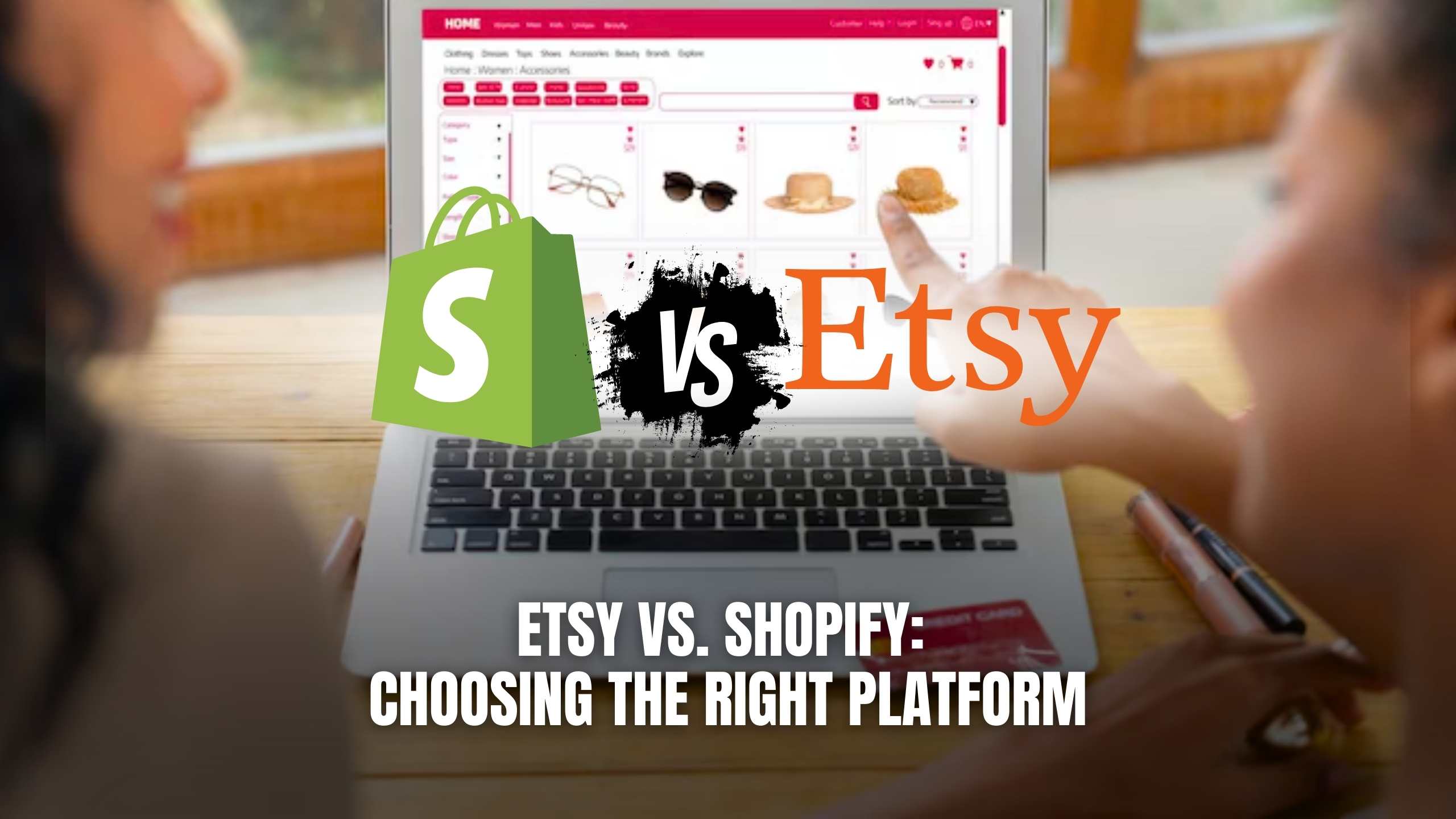Etsy vs. Shopify: Choosing the Right Platform


Etsy vs. Shopify: Choosing the Right Platform
When it comes to setting up an online store, selecting the right e-commerce platform is crucial for success. Etsy and Shopify are two popular choices, each with its own strengths and limitations. In this guide, we’ll compare Etsy and Shopify to help you make an informed decision about which platform is best suited for your online business needs.
1. Customization and Branding
Shopify offers extensive customization options, allowing you to create a fully branded and unique online store tailored to your preferences. Customizable themes empower you to craft a visually captivating storefront that mirrors your brand identity and appeals to your audience. On the other hand, while Etsy provides some customization features, such as adding a banner and shop icon, its platform is primarily designed for sellers to list products within the Etsy marketplace, limiting branding opportunities.
2. Product Variety and Marketplace Presence
Etsy is renowned for its marketplace of handmade, vintage, and unique products, attracting a niche audience of shoppers looking for one-of-a-kind items. By selling on Etsy, you gain access to a built-in customer base and benefit from the platform’s established reputation and search visibility. In contrast, Shopify allows you to sell a wider range of products, including physical goods, digital downloads, and services, and provides flexibility in expanding your online presence beyond your Shopify store through integrations with social media channels and marketplaces.
3. Pricing and Fees
Both Etsy and Shopify operate on a fee-based model, but their fee structures differ significantly. Etsy charges listing fees, transaction fees, and payment processing fees for each sale made through the platform, with additional optional fees for promoted listings and other services. Shopify, on the other hand, offers various pricing plans with monthly subscription fees and transaction fees, but allows you to avoid listing fees and offers more control over your pricing strategy and profit margins.
4. Customer Support and Resources
Shopify provides comprehensive customer support, including 24/7 live chat, email, and phone support, along with an extensive knowledge base and community forums. Additionally, Shopify offers a range of educational resources, such as webinars, tutorials, and blog articles, to help merchants succeed in their e-commerce endeavors. Etsy provides seller support like handbooks and forums, but it may lack the personalized and extensive assistance found in Shopify.
5. Integration and Scalability
Shopify seamlessly integrates with diverse third-party apps, enhancing functionality and streamlining operations, showcasing its prowess in integration capabilities. Shopify’s app store provides various solutions for inventory, email marketing, and accounting needs, enhancing your store’s capabilities efficiently. Etsy’s integration options are limited, potentially hindering scalability for sellers aiming to expand beyond the Etsy marketplace.
Recommended SaaS Products
- Shopify: Comprehensive e-commerce platform with customizable stores, integrated payments, and app integrations, empowering businesses to launch, manage, and scale effectively.
- Etsy: A platform for handmade, vintage, and unique products, empowering sellers with access to customers, search visibility, and community support.
- Mailchimp: Email marketing platform creates, sends, automates campaigns, engages customers, drives sales via personalized strategies, and audience segmentation tools.
- Oberlo: Shopify’s dropshipping app streamlines sourcing and order fulfillment, allowing merchants to add products from global suppliers with automated features.
- QuickBooks Online: Cloud-based accounting software manages finances, tracks expenses, generates invoices, and streamlines bookkeeping, offering insights for better financial decision-making.
Conclusion
Choosing between Etsy and Shopify depends on your specific business requirements, target audience, and long-term goals. While Etsy provides a built-in marketplace and caters to sellers of handmade and unique products, Shopify offers greater flexibility, customization, and scalability for merchants looking to establish a branded online presence and grow their business independently. Consider factors such as branding opportunities, product variety, pricing, customer support, and integration capabilities when deciding which platform aligns best with your e-commerce strategy.
Ready to Launch Your Online Store?
Sign up for free at Subscribed.fyi to access exclusive deals on essential SaaS tools for e-commerce success. Unlock secret deals on Shopify apps, marketing tools, analytics platforms, and more to optimize your online store’s performance and drive growth.
Relevant Links:





